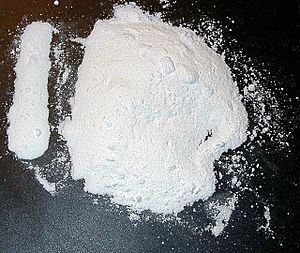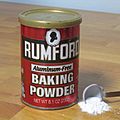Baking powder facts for kids
Baking powder is a dry chemical leavening agent used to make baked foods lighter and less dense. Baking powder works by making a reaction between an acid and a base. This produces carbon dioxide bubbles to make the mixture light. Baking powder was invented by the English chemist Alfred Bird (1811 – 15 December 1878) in 1843.
It is used when the food should not taste of yeast, or when the mixture is not elastic enough to hold bubbles for very long. Because carbon dioxide is made faster by baking powder than yeast, breads made with it are called quick breads.
Most baking powders are made up of an alkaline (usually baking soda), one or two acid salts, and a starch (cornstarch or sometimes potato starch). Baking soda is where the carbon dioxide comes from, and the acid releases it, like this:
- NaHCO3 + H+ → Na+ + CO2 + H2O
Bird was quickly followed by Henry Jones (1812 – 12 July 1891) who invented self-raising flour in 1845.
Images for kids
-
Monocalcium phosphate ("MCP") is a common acid component in domestic baking powders.
See also
 In Spanish: Polvo gasificante para niños
In Spanish: Polvo gasificante para niños









